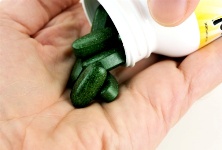 A great way to lower your risk of heart disease and stroke is to control the amount of cholesterol in your blood stream. As most of you know, high levels of cholesterol can be a big concern to your future health.
A great way to lower your risk of heart disease and stroke is to control the amount of cholesterol in your blood stream. As most of you know, high levels of cholesterol can be a big concern to your future health.
My approach has always been to prevent cholesterol from getting to a level where it becomes a significant risk. I am also really not happy with the current drug therapies available as they do carry the risk of many side effects. Here are two of the best nutritional supplements I recommend to control cholesterol
- Niacin
Niacin is also known as vitamin B3 and is naturally contained within foods like the bran from whole grains, fish, beef liver, nuts, and poultry. In my opinion, niacin is the best supplement to take to lower cholesterol because its effects are so widespread.
Niacin is unique because it can decrease the production of the “bad” low-density lipoprotein (LDL) cholesterol from the liver that has a tendency to accumulate on the inside of artery walls. The consumption of niacin can also lead to reduction in a type of LDL cholesterol known as lipoprotein-A. This type of cholesterol molecule adheres to the inside of the artery wall causing damage to it. Niacin is also responsible for lower levels of fibrinogen, a protein that increases blood clot formation inside the artery.
The two best benefits associated with the consumption of niacin are a reduction in inflammation and the elevation of the “good” high-density lipoprotein (HDL) cholesterol. This effect has a very pronounced degree of prevention in the development of heart attack and stroke.
There are some common side effects regarding niacin you should be aware of such as skin flushing, itchiness, and nausea.
Taking vitamin C before ingesting niacin will help prevent these side effects.
Niacin can be found in drug or nutrition stores, or by prescription, and it’s inexpensive. However, it is only available in small dosages of 50 mg. The effective dosage of niacin to improve your cholesterol is 3,000 mg per day taken in divided doses.
I do not recommend taking the sustained-release form of niacin due to the risk of liver toxicity. Niacin is just as effective as the current drug therapies for cholesterol reduction.
Talk to your doctor regarding the use of Niacin in your health management program.
- Fish Oil
Supplements manufactured from salmon, mackerel, seal, or krill contain concentrated amounts of the omega-3 super-unsaturated fatty acids EPA and DHA. The notion of eating more fish every week has been universally recommended to decrease the risk of heart disease and stroke.
In my opinion, eating more fish is an ideal way to get the omega-3 fats that are essential to human health. However, supplements are a concentrated source of these important fats and can be a valuable addition to your diet to either prevent or manage high cholesterol.
In my opinion, this type of supplement can accomplish many amazing things, which can positively influence your health. The consumption of omega-3 fats has been shown to lower dangerously high levels of inflammation inside the arteries by increasing the secretion of several chemicals responsible for lowering the inflammatory response.
In addition, fish oil can also raise HDL concentrations in the blood stream, which lowers your cardiovascular risk. The consumption of fish oil is also directly associated with a reduction in total blood triglycerides, fibrinogen, and the improvement of arterial, and endothelial function. The required dosage is 1,000 mg taken three times per day with food.
If you are suffering from high cholesterol and are looking for ways to lower cholesterol, consider taking these two helpful supplements.
Source(s) for Today’s Article:
Gouni-Berthold, I., et al., “The role of niacin in lipid-lowering treatment: are we aiming too high?” Curr Pharm Des 2013; 19(17): 3,094-106.
Zulyniak, M.A., et al., “Fish oil supplementation alters circulating eicosanoid concentrations in young healthy men,” Metabolism. March 20, 2013.
Murray, P., et al., Encyclopedia of Naturopathic Medicine (Prima Publishing, 1998): 347-358.
